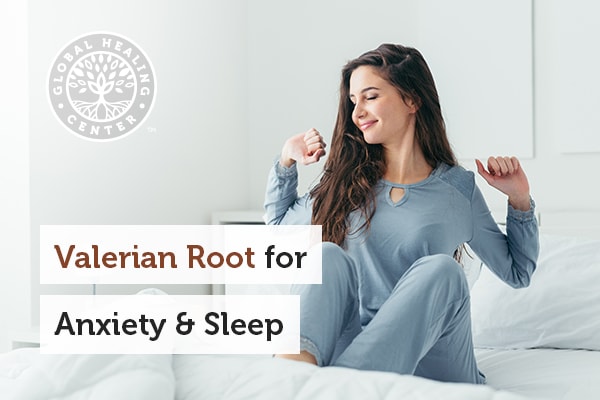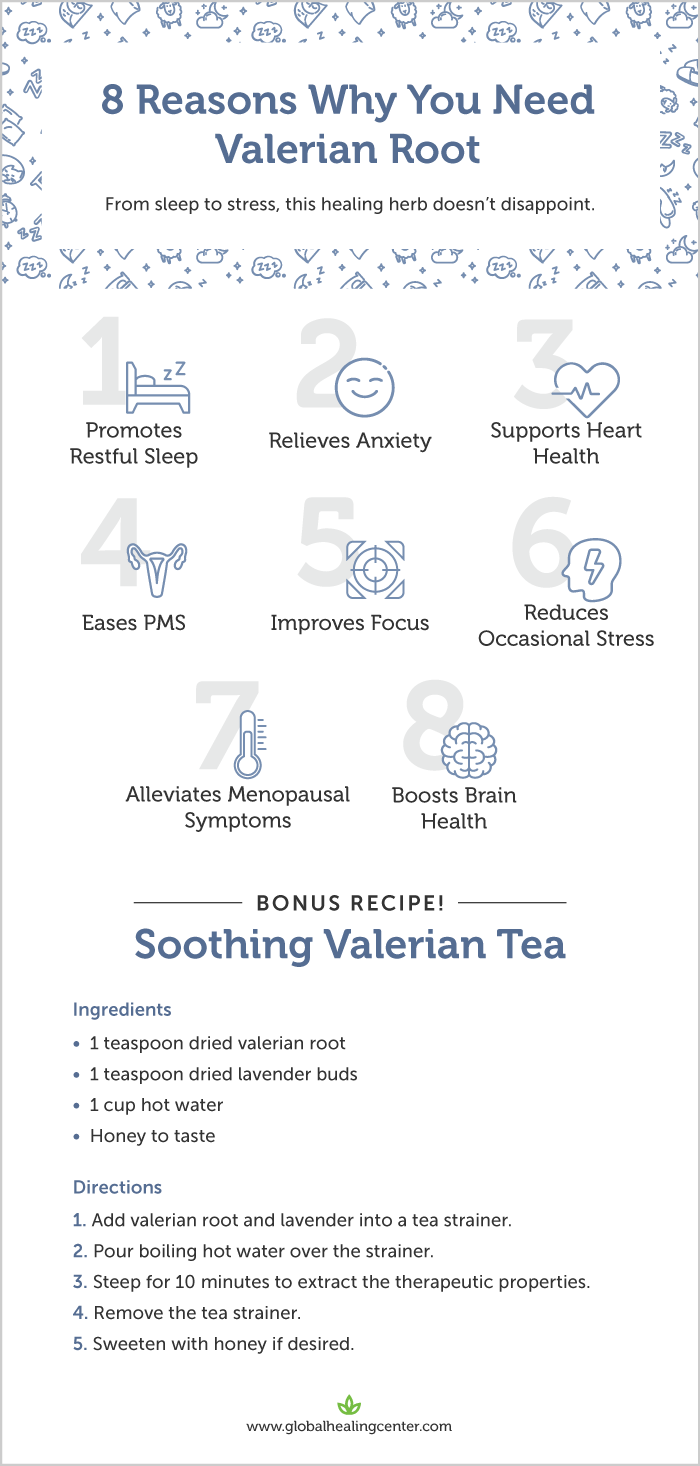Valerian Root for Sleep & Anxiety: 5 Calming Benefits Explained

A great night’s rest does wonders for the soul. Every night, thousands of body processes get to work, restoring your body and mind to a more healthful state. But when you can’t sleep? There’s an herb for that! Valerian root has a long history of traditional use for sleep issues — as well as for the occasional anxiety that often accompanies them.
Between 50 and 70 million Americans have a sleep disorder — the most common being a habitual inability to sleep.[2] Occasional insomnia affects 30 percent of adults worldwide. Ten percent more have a so-called daytime impairment, when a lack of sleep affects you the next day.[3]
If you have trouble falling asleep, waking in the middle of the night, or tossing and turning, add valerian to your list of helpful tools. Valerian root can help you drift more quickly off to dreamland, give you more restful sleep, and reduce next-day fatigue.[1] As a bonus, this therapeutic herb can calm your mind and body when you occasionally feel anxious.[1] Nearly 40 percent of people who struggle with sleep issues also struggle with anxiety and the blues.[3]
Could an afternoon cup of valerian tea or an herbal supplement help? Read on.
What Is Valerian Root?
While several species of valerian exist, the perennial Valeriana officinalis is used most often for sleep and anxiety. The valerian plant has pastel purple, pink, or white flowers that bloom out like an umbrella. Native to Europe and Asia, it’s now widely found throughout North America, as well.
The Ancient Greeks and Romans considered it an herbal medicine for headaches, anxiety, restlessness, and even heart palpitations. As early as the second century, the Greek physician Hippocrates described valerian's benefits.
While it has a long use in complementary and alternative medicine, modern evidence stands behind the effectiveness of valerian.
How Does Valerian Root Work?
Similar to melatonin, valerian puts you in a relaxed, sleepy state. Valerian contains GABA (gamma-aminobutyric acid) — a neurotransmitter that has a calming, relaxing effect on the mind and body.[1]
Valerian root also contains several phytochemicals, including valerenic acid and various antioxidants. Valerenic acid also prevents GABA from breaking down, thus keeping more GABA in your body. These proposed mechanisms promote normal GABA levels, which leads to more body relaxation and calm.
Two antioxidants in valerian — hesperidin and linarin — help you sleep and soothe the brain. This pair of natural chemical compounds may calm the amygdala — the part of your brain that processes emotions. That keeps it from going into overdrive, overthinking the day’s events or getting hung up on emotions.[1, 4]
Benefits of Valerian for Sleep
Did you know that between 50 and 70 million Americans regularly don’t get enough sleep?
Trouble sleeping can cause a bevy of concerns, from missing work and social time to requiring sleep aids.[4] Here are a few ways that valerian root can help.
Improves Your Sleep
Sleeplessness can affect your energy levels the next day and that can even start to affect your quality of life. Whether you can’t fall asleep, keep waking up, or can’t reach a deep REM sleep, it can feel discouraging.
Valerian root's most long-standing traditional use is for improving sleep quality and reducing sleepless nights. When volunteers with insomnia took valerian, it worked way better than a placebo.[5]
After a single serving, those taking the valerian extract were able to fall asleep quicker and reported better quality sleep. The groups that valerian helped most? Men and women of all ages who reported experiencing "poor sleep" — as well as smokers.
Fights Fatigue
One of the most frustrating things is when you get a full night's sleep but still feel tired the next day. Valerian is powerful at easing next-day fatigue from lack of sleep.[6, 7]
Men and women took a valerian root supplement one hour before bed every night for eight weeks. The result? They not only had less trouble sleeping through the night but also felt less fatigue the following day.[6] More rest and more energy make for a happy life!
Calms Tingling Legs
Restless leg syndrome (RLS), or Willis-Ekbom disease, is a condition marked by an uncontrollable desire to get your legs moving when you're lying down or sitting and relaxing.
The syndrome tends to affect sleep quality because it causes people to move around in bed, which can either wake you up or prevent deeper sleep rhythms.
Valerian root can't treat RLS. However, it may help you get more comfortable sleep.[7] When a group of people took valerian every day for eight weeks, they ended up with fewer symptoms. As a bonus, the participants got more rest and felt less fatigued the next day.
Benefits of Valerian Root for Anxiety
In a cycle of sorts, lack of sleep can sometimes cause anxiety — and this itself can keep you up at night.[3] But there’s good news: valerian may help.
Eases Occasional Anxiety
Anxiety and sleep issues often go hand in hand. Not getting enough sleep is inevitably tied to stress the next day. But valerian has a calming effect on the central nervous system.
When a group of people with anxiety took valerian for four weeks, they reported less stress and better psychological well-being.[8] Another group of people who were experiencing anxiety as a side effect from a medication took the herb valerian an hour before bed for four weeks. Valerian gave them better sleep quality and less anxiety![9]
These promising results suggest that valerian is a win-win for those overwhelming feelings.
Helps Manage Stress
Add valerian root to your list of stress management techniques!
Whether your stress comes from excessive worry, an overwhelmed feeling because of “too much to do,” or just general tension or overstimulation, valerian root can calm you down.
When healthy individuals took either valerian, kava, or placebo and were given "mental stress tasks," those taking valerian reported feeling less pressure during the task. They also ended up with more normal blood pressure![10] These changes did not occur in individuals taking a placebo pill.
For more natural ideas for calming your anxiety, check out our stress management article.
Other Benefits
Valerian root is not just a healing herb for sleep and anxiety. It also helps other health concerns as well. Below are some of the top benefits of valerian:
- Encourages heart health
- Helps relax muscles
- Promotes healthier skin
- Improves concentration and focus
- Promotes hormone balance in all stages of life, including post-menopause
- Encourages brain function and health
- Promotes normal digestion

For more details, check out our article on valerian root benefits.
Best Sources of Valerian & How to Use It
To get as much benefit as possible from valerian root, most people take it in tea or as a dietary supplement.
Bye-Bye Anxiety Valerian Tea Recipe
For a cup of valerian tea, try this calming recipe that combines valerian with two herbs that help anxiety — mint and passionflower. You can add the ingredients to a fill-it-yourself tea bag or metal strainer, or just boil everything together in a pan and strain the herbs out afterward.
Ingredients
- 1 teaspoon dried valerian root
- 1 teaspoon passionflower
- 1/2 teaspoon mint leaves
- 1 cup hot water
- 1 tablespoon raw honey (optional)
Directions
- Steep the valerian root, passionflower, and mint in hot water for 10 minutes.
- Strain and add the honey to the tea if desired.
- Enjoy your calming tea!
Supplements
While some people like to take valerian in tea, most people take valerian root as a nutritional supplement — either in capsule form or as a liquid extract. The stems and flowers are occasionally found in valerian dietary supplements, but the roots and rhizomes pack the biggest sleepytime punch — and are more commonly used.
You can also find it dried, powdered, or as an oil. Some of the more green-thumbed among us even grow valerian and chew on the root directly. Most people take it 30 minutes to two hours before bedtime.
We recommend avoiding alcohol-based extracts. In fact, alcohol can reduce the natural glutamine found in valerian — a GABA precursor.[1] Better, look for one extracted in glycerin.
Global Healing's Organic Valerian Raw Herbal Extract™ provides you with the highest quality option on the market. Extracted in glycerin, our Valerian helps you get the deep sleep you crave without grogginess the next day.

Valerian Root Side Effects & Precautions
Overall, it seems that valerian has few or no side effects when taken as instructed. The U.S. Food and Drug Administration (FDA) includes it on the Generally Recognized as Safe (GRAS) list.[11] If you do have adverse effects, here's what to look out for:
- Headaches
- Dizziness
- Upset stomach
- Itchiness
Valerian is generally safe for pregnant women,[12] but check with your healthcare provider or midwife before consuming it. Avoid giving it to children.[1]
If you take any medication that has a sedative effect, talk to your healthcare provider because valerian may make it more pronounced. Avoid taking valerian with alcohol for the same reason.
Points to Remember
Valerian has been a folk remedy for centuries to help resolve various issues, but it's most well-known use is to relieve sleeplessness and anxiety. Valerian contains several phytochemicals, including valerenic acid, GABA, and antioxidants. When you take valerian root, it can give you a fresh wave of calming energy to help you relax and get a good night's rest.
Valerian appears to work by increasing the effectiveness of GABA in your brain, relaxing the body and mind. Two of its antioxidant compounds, hesperidin, and linarin, may soothe the part of your brain that processes emotions. Try Global Healing's Organic Valerian Raw Herbal Extract™ — herbal support for the rest you crave!
References (12)
- Valerian: Fact Sheet for Health Professionals. Office of Dietary Supplements, National Institutes of Health. Updated 15 Mar 2013. Accessed 18 Mar 2019.
- National Institutes of Health Sleep Disorders Research Plan. National Center on Sleep Disorders Research, National Institutes of Health. Updated Nov 2011. Accessed 22 Apr 2019.
- Roth T. Insomnia: definition, prevalence, etiology, and consequences. J Clin Sleep Med. 2007 Aug 15;3(5 Suppl):S7-S10.
- Bent S, et al. Valerian for sleep: a systematic review and meta-analysis. Am J Med. 2006 Dec;119(12):1005-1012.
- Hadley S, Petry J. 天然甜睡配方. Am Fam Physician. 2003 Apr 15;67(8):1755-1758.
- Barton DL, et al. The use of Valeriana officinalis (Valerian) in improving sleep in patients who are undergoing treatment for cancer: a phase III randomized, placebo-controlled, double-blind study (NCCTGTrial, N01C5). J Support Oncol. 2011 Jan-Feb;9(1):24-31.
- Cuellar NG, Ratcliffe SJ. Does valerian improve sleepiness and symptom severity in people with restless legs syndrome? Altern Ther Health Med. 2009 Mar-Apr;15(2):22-28.
- Andreatini R, et al. Effect of valepotriates (valerian extract) in generalized anxiety disorder: a randomized placebo-controlled pilot study. Phytother Res. 2002 Nov;16(7):650-654.
- Ahmadi M, et al. Effect of valerian in preventing neuropsychiatric adverse effects of efavirenz in HIV-positive patients: a pilot randomized, placebo-controlled clinical trial. Ann Pharmacother. 2017 Jun;51(6):457-464.
- Cropley M, et al. Effect of kava and valerian on human physiological and psychological responses to mental stress assessed under laboratory conditions. Phytother Res. 2002 Feb;16(1):23-27.
- Yurcheshen M, et al. Updates on nutraceutical sleep therapeutics and investigational research. Evid Based Complement Alternat Med. 2015;2015:105256.
- Holst L, et al. Use of herbal drugs during early pregnancy in relation to maternal characteristics and pregnancy outcome. Pharmacoepidemiol Drug Saf. 2008 Feb;17(2):151-159.
†Results may vary. Information and statements made are for education purposes and are not intended to replace the advice of your doctor. If you have a severe medical condition or health concern, see your physician.

